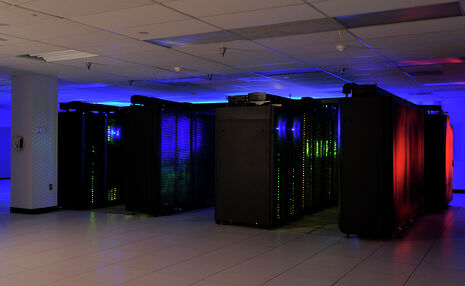The technological revolution will change the face of work
Mollie Semple thinks about how the development of new technologies will impact our careers

Career plans for our generation are going to be very different from ever before: we’re going to have to factor in whether the job we want will actually exist in a few years’ time. Thinking of selling your soul to a corporate job or a bank for “only five years until I make enough to retire at 27”? Well, you might not have to worry about getting trapped in that world for much longer because chances are you’ll be replaced by a machine pretty soon anyway. Okay, so maybe we’re not that close to replacing the corporate bureaucratic world with computers, but we’re not far off. It’s no longer a question of it maybe happening because it definitely will.
Perhaps many of us at Cambridge won’t be affected by this technological revolution. Most of us will aim quite high and graduate with qualifications good enough to get us into jobs that won’t be facing computerised replacement any time soon. But many people who will end up in the lower end of corporate jobs, jobs that are routine, repetitious and bureaucratic, will find that those positions simply won’t exist in the near future.
And it isn’t primarily corporate and financial careers either – jobs in the legal sector, even the medical sector, might be affected. There are already programmes that can write editorial copy and then pull it into a publication which removes any demand for human copy editors; but there are all sorts of jobs that can be wiped out by that kind of technology. Decentralised accreditation systems affect businesses like taxi services. Say you have someone checking on every taxi driver; where they are, who are they picking up, what orders they’re taking – there is no need for centralised authority like that with the kind of technology that exists now.
It’s not necessarily about profit increase by letting go of workers, which will be the case a lot of the time, but about a change in purpose and in human efficiency.
Consider the future of self-driving cars: removing the risk drivers represent means a diminishing motor insurance industry. Without the kinds of problems humans can encounter while driving such as poor sight, distraction, drunkenness, sudden illness and tiredness, there will inevitably be less accidents. Computerised cars will be able to calculate everything going on around them in a way that humans are not capable of. Fewer accidents mean fewer police monitoring motorways, and less pressure on hospitals to deal with car-related injuries. The future of technology does not just replace jobs, it renders them obsolete.
But none of this has to be a bad thing. The future of technology does not signal the end of the world if we accept and let it take over. Jobs that will no longer exist will create new ones instead. If there are jobs that can be replaced by machines, surely there is some benefit to the humans who work like robots every day. This isn’t quite like the Industrial Revolution either, where skilled labour was replaced by steam engines and new factory machinery. Then there was a loss in hand-made manufacturing, in human skill. This new technological rise will see the loss of a bureaucratic world that has run its course anyway.
It’s possible that we’ll see another ‘Luddite’ revolution. Workers threatened with unemployment rising against the machine. This is obviously understandable, natural even. Perhaps it is already happening with the rail strikes where workers in jobs quite easily replaceable by computers are standing their ground. What needs to happen to prevent this is a better understanding of the technology that’s coming in. Why are these computerised systems needed? What is going to happen to all the workers who will be out of a job?
The last question most likely won’t be answered until the jobs are actually replaced. Hopefully we’ll see a growth in creativity and in science. More jobs will open up that don’t require robotic repetition, so perhaps there will be a rise in collaboration, in innovation. There must be a rise in the number of people working in the technology industry in order to keep up with the machines we’re putting out there. We’re already lacking in developers and programmers so the demand will be huge.
What is so hard about this, as I guess was hard during the industrial revolution, is how to know what happens next. The hope is that the bureaucratic jobs that are no longer useful, that they are outdated, will be eradicated, but any damage caused by subsequent unemployment is minimised. How do we make that happen?
Major advances in technology bring about a change that is desperately needed in the workplace. It’s not necessarily about profit increase by letting go of workers, which will be the case a lot of the time, but about a change in purpose and in human efficiency. As a generation we enter the workplace amid a revolution. So far it’s a quiet one, it creeps up on us one new machine, one new programme, one new algorithm at a time. But it’s there and it’s happening. We just have to work out what to do with it once we get there
 News / Eight Cambridge researchers awarded €17m in ERC research grants27 December 2025
News / Eight Cambridge researchers awarded €17m in ERC research grants27 December 2025 News / Clare Hall spent over £500k opposing busway 24 December 2025
News / Clare Hall spent over £500k opposing busway 24 December 2025 Comment / League tables do more harm than good26 December 2025
Comment / League tables do more harm than good26 December 2025 Comment / The ‘class’ of Cambridge24 December 2025
Comment / The ‘class’ of Cambridge24 December 2025 News / Caius mourns its tree-mendous loss23 December 2025
News / Caius mourns its tree-mendous loss23 December 2025








